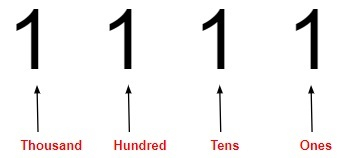
给定一个由数字组成的字符串,任务是将这些给定的数字转换为单词。
比如我们有一个输入“361”;那么输出应该是单词形式,即“三百六十一”。对于解决这个问题,我们需要记住数字和它所在的位置,比如个位、十位、千位等。
代码只支持0到9999的4位数字。所以输入应该在0到9999之间。
让我们考虑1,111,那么位置将会是这样:

Input: “1234” Output: one thousand two hundred thirty four Input: “7777” Output: seven thousand seven hundred seventy seven
我们将使用的方法来解决给定的问题 −
Start
Step 1 → In function convert(char *num)
Declare and initialize int len = strlen(num)
If len == 0 then,
fprintf(stderr, "empty string</p><p>")
Return
End If
If len > 4 then,
fprintf(stderr, "Length more than 4 is not supported</p><p>")
Return
End If
Declare and initialize a char *single_digit[] = { "zero", "one", "two","three", "four","five","six", "seven", "eight", "nine"}
Declare and initialize a char *tens_place[] = {"", "ten", "eleven", "twelve","thirteen", "fourteen","fifteen", "sixteen","seventeen", "eighteen", "nineteen"}
Declare and Initialize a char *tens_multiple[] = {"", "", "twenty", "thirty", "forty", "fifty","sixty", "seventy", "eighty", "ninety"}
Declare and initialize char *tens_power[] = {"hundred", "thousand"}
Print num
If len == 1 then,
Print single_digit[*num - '0']
Return
End If
While *num != '\0
If len >= 3
If *num -'0' != 0
Print single_digit[*num - '0']
Print tens_power[len-3]
End If
Decrement len by 1
End If
Else
If *num == '1' then,
Set sum = *num - '0' + *(num + 1)- '0'
Print tens_place[sum]
Return
End If
Else If *num == '2' && *(num + 1) == '0' then,
Print “twenty”
Return
End else If
Else
Set i = *num - '0'
Print i? tens_multiple[i]: ""
Increment num by 1
If *num != '0' then,
Print single_digit[*num - '0']
End If
End Else
Increment num by 1
End Else
End while
Step 2 → In function main()
Call function convert("9132")
Stop#include <stdio.h>
#include <string.h>
#include <stdlib.h>
//function to print the given number in words
void convert(char *num) {
int len = strlen(num);
// cases
if (len == 0) {
fprintf(stderr, "empty string</p><p>");
return;
}
if (len > 4) {
fprintf(stderr, "Length more than 4 is not supported</p><p>");
return;
}
// the first string wont be used.
char *single_digit[] = { "zero", "one", "two", "three", "four","five", "six", "seven", "eight", "nine"};
// The first string is not used, it is to make
// array indexing simple
char *tens_place[] = {"", "ten", "eleven", "twelve", "thirteen", "fourteen", "fifteen", "sixteen", "seventeen", "eighteen", "nineteen"};
// The first two string are not used, they are to make
// array indexing simple
char *tens_multiple[] = {"", "", "twenty", "thirty", "forty", "fifty","sixty", "seventy", "eighty", "ninety"};
char *tens_power[] = {"hundred", "thousand"};
// Used for debugging purpose only
printf("</p><p>%s: ", num);
// For single digit number
if (len == 1) {
printf("%s</p><p>", single_digit[*num - '0']);
return;
}
// Iterate while num is not '\0'
while (*num != '\0') {
// Code path for first 2 digits
if (len >= 3) {
if (*num -'0' != 0) {
printf("%s ", single_digit[*num - '0']);
printf("%s ", tens_power[len-3]); // here len can be 3 or 4
}
--len;
}
// Code path for last 2 digits
else {
// Need to explicitly handle 10-19. Sum of the two digits is
//used as index of "tens_place" array of strings
if (*num == '1') {
int sum = *num - '0' + *(num + 1)- '0';
printf("%s</p><p>", tens_place[sum]);
return;
}
// Need to explicitely handle 20
else if (*num == '2' && *(num + 1) == '0') {
printf("twenty</p><p>");
return;
}
// Rest of the two digit numbers i.e., 21 to 99
else {
int i = *num - '0';
printf("%s ", i? tens_multiple[i]: "");
++num;
if (*num != '0')
printf("%s ", single_digit[*num - '0']);
}
}
++num;
}
}
int main() {
convert("9132");
return 0;
}nine thousand one hundred thirty two
Atas ialah kandungan terperinci Terjemah yang berikut ke dalam bahasa Cina: Program C untuk menukar nombor yang diberikan kepada bahasa Cina. Untuk maklumat lanjut, sila ikut artikel berkaitan lain di laman web China PHP!




